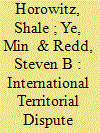|
|
|
Sort Order |
|
|
|
Items / Page
|
|
|
|
|
|
|
| Srl | Item |
| 1 |
ID:
083667


|
|
|
|
|
| Publication |
2008.
|
| Summary/Abstract |
Ethnic insurgencies have received less scholarly attention than colonial or ideological insurgencies-even as they have become the predominant form of insurgency following the decolonization process and then the end of the Cold War. In the face of ethnic insurgencies, what determines the effectiveness of the various counterinsurgency strategies adopted by host states? Are democracies more likely to succeed by pursuing some kinds of counterinsurgency strategies rather than others? Theory indicates that multiple counterinsurgency strategies, if thoroughly implemented, can defeat ethnic insurgencies. Host state regime type-particularly democracy-is important as a constraint on the will to employ and thoroughly implement some counterinsurgency methods. Democracies are most likely to defeat ethnic insurgencies by employing more cooperative or "balanced" strategies. Although such strategies employ economic and political inducements and rely on local ethnic elements to help fight the insurgents, they also depend on a credible host state commitment to sustain the counterinsurgency for as long as it takes to win. Case studies of India's multiphased counterinsurgency efforts in Punjab and Kashmir offer some preliminary evidence in support of this theory. In both Punjab and Kashmir, early counterinsurgency efforts relied on less discriminate campaigns conducted by central armed forces or by illegitimate local proxies. The outcomes were strengthened insurgencies. In both cases, the Indian state adapted by seeking the cooperation of legitimate local moderates in more discriminate counterinsurgency efforts. These later, "balanced" strategies were more effective. This was particularly true in Punjab, where conditions for local cooperation were more favorable.
|
|
|
|
|
|
|
|
|
|
|
|
|
|
|
|
| 2 |
ID:
181268


|
|
|
|
|
| Summary/Abstract |
Direct, large-sample measures of leadership preferences on both sides of ethno-territorial civil wars have not hitherto been available. As a result, statistical research diverges from case study research in omitting analysis of causes and consequences of leadership preferences. We present a new database that directly measures variation in the nationalist ideological preferences of state and ethnic rebel group leaders for post-World War II, ethno-territorial civil wars. Our measures, four-level ordinal scales of minimum acceptable demands, capture both the extent and the intensity of leaders’ upside goals. We examine institutional and cultural sources of these measures while controlling for material sources. Institutionally, regime type more strongly predicts state-side demands than rebel-side demands. Among cultural sources, we find that religious identity-based predictors are significant and powerful predictors. Among material sources, we find that both relative power and status quo predictors have weak statistical and substantive significance. These results indicate that variation in leadership preferences is best explained by institutional and cultural forces, rather than by material conditions related to relative power or status quo conditions.
|
|
|
|
|
|
|
|
|
|
|
|
|
|
|
|
| 3 |
ID:
086754


|
|
|
|
|
| Publication |
2009.
|
| Summary/Abstract |
While government turnover is often thought of as an adverse source of instability, it may also be viewed as a favourable source of competition and institution-building. To articulate and test such hypotheses, this article describes two main concepts of government turnover: leadership turnover, or change in rulers, and ideological turnover, or change in the rulers' ideology. Refinements involve the mode, outcome and timing of turnover. The article discusses measurement issues that arise when there are multiple power institutions and when parliaments are controlled by changing majority coalitions. The measures of turnover are illustrated by examining the post-communist world. The article considers the possibility that higher cumulative post-transition turnover - in terms of leaderships or ideologies - has assisted in establishing the rule of law.
|
|
|
|
|
|
|
|
|
|
|
|
|
|
|
|
| 4 |
ID:
156806


|
|
|
|
|
| Summary/Abstract |
The territory contested in island disputes is often of low intrinsic value from the national security and economic perspectives. This generally implies a stable status quo where both sides prefer peace to war. Yet island disputes commonly produce a variation whereby states engage in some degree of ‘hawk-talk’—more or less confrontational rhetoric and related, symbolically important policies. Theoretically, hawk-talk should be more likely when the disputing countries have a strong, nationalistically salient history of conflict and less likely when they have high levels of cooperation in other national security areas or economic relations. Hawk-talk is expected to beget more hawk-talk, thus to increase the ideological and diversionary political value of assertiveness in island disputes, and to limit or reduce cooperation. Nationalistically salient histories of conflict amplified by hawk-talk can most easily be shown to raise the stakes and risks in low intrinsic value disputes. Yet such histories are expected to have an even greater potential impact on high intrinsic value disputes. We illustrate this logic by analysing the low-intrinsic-value dispute between Korea and Japan over the Dokdo/Takeshima Islands. Both the theory and the case study imply that cooperation in other areas does not constitute a reliable antidote to hawk-talk–driven dispute escalation. Countervailing national interest ideologies, which emphasise other objectives imperilled by dispute escalation, are the most promising complement to increased cooperation.
|
|
|
|
|
|
|
|
|
|
|
|
|
|
|
|
| 5 |
ID:
160365


|
|
|
|
|
| Summary/Abstract |
Ethno-national territorial disputes typically involve conflicting homeland claims between states and minority ethnic groups. Where such minority ethnic groups have cross-border ethnic kin who themselves constitute a dominant or influential ethnic group in a neighbouring state, separatist goals may take the form of either irredentism or independence. We conjecture that external sympathy for irredentism and independence may vary significantly, and that this variation may be an important influence in situations where secessionist groups and ethnic kin states have a choice between the two goals. Using a bargaining framework that controls for variation in relative power, status quo conditions and minority-side leadership preferences, we present experimental evidence indicating that external audiences are likely to support more confrontational policies in pursuit of independence than in pursuit of irredentism. Our evidence also indicates that independence attracts greater support largely because outsiders perceive it as a more legitimate goal; and that practical efficacy is not important in stimulating sympathy for either independence or irredentism. These results also support a broader argument in the literature on international norms – that such norms receive support not only because they may justify pre-existing goals or interests, but also because they are perceived as having greater legitimacy per se.
|
|
|
|
|
|
|
|
|
|
|
|
|
|
|
|
| 6 |
ID:
174819


|
|
|
|
|
| Summary/Abstract |
Within international relations theory, there is significant disagreement on the nature and significance of leaders’ dispute outcome preferences. While many variants of realism assume that such preferences are relatively fixed and homogeneous, both the liberal and the constructivist schools view them as significant variables. This debate remains unresolved because, for the standard large-sample conflict data sets, there are no direct measures of leadership preferences over outcomes in given types of international disputes. Using a conflict bargaining experiment, we ask whether, after controlling for the effects of relative power and initial conditions, leadership preferences have a statistically significant impact. We use two different country samples—from China and the United States—to examine whether the impact of leadership preferences varies internationally. We find that realist-style preferences are a special rather than a general case, and that such differences have significant implications for understanding continuities and changes in Chinese and US foreign policies.
|
|
|
|
|
|
|
|
|
|
|
|
|
|
|
|
| 7 |
ID:
159574


|
|
|
|
|
| Summary/Abstract |
In the conflict bargaining literature, three variables have a primary explanatory role: relative power, status quo conditions, and leadership preferences. While leadership preferences loom large in case study research, they are either absent or poorly proxied in large-N statistical studies. Using a series of three experiments, we test for the effects of relative power, status quo conditions, and leadership preferences on decisions to apply various levels of nonviolent and violent pressure in ethno-territorial disputes. The experimental designs presented in this study offer the opportunity to isolate the impact of leadership preferences on political strategy choices in ethno-territorial disputes. The results demonstrate that, at least in an experimental setting, leadership preferences are, in fact, significant predictors of political strategy choices, even after controlling for relative power and status quo conditions.
|
|
|
|
|
|
|
|
|
|
|
|
|
|
|
|
| 8 |
ID:
126021


|
|
|
|
|
| Publication |
2013.
|
| Summary/Abstract |
Theoretically, variation in leadership preferences is often taken to be an important predictor of ethno-territorial conflict outcomes. Yet there is a significant gap when it comes to applying this theory. Case studies do not take a consistent approach to measuring leadership preferences, while statistical research tends to omit the variable altogether. This paper suggests a standardized approach to measuring leadership preferences along two dimensions - a dimension that captures the weight given to achieving ideal nationalist goals as against minimizing conflict costs and downside conflict risks, and a dimension that indicates how much intrinsic nationalist goals are valued relative to the goal of taking and maintaining political power. The resulting measurement template is then applied to seven potential ethno-territorial conflicts in Yugoslavia in the early 1990s. These cases indicate that leadership preferences may help to explain ethno-territorial conflict outcomes and, at the same time, are sometimes not well predicted by other important variables, such as the balance of power and the pre-conflict status quo.
|
|
|
|
|
|
|
|
|
|
|
|
|
|
|
|
| 9 |
ID:
058446


|
|
|
| 10 |
ID:
122409


|
|
|
|
|
| Publication |
2013.
|
| Summary/Abstract |
In internal ethno-territorial conflicts, what explains why state or rebel group leaderships use civilian-targeting strategies-expulsion or mass killing strategies designed to punish enemy civilians or to decimate the enemy civilian presence on contested territory? One argument is that those living under the worst initial conditions-defined in terms of collective goods such as weak collective autonomy, policy outcomes, and material conditions-are most likely to target enemy group civilians. Another approach focuses on relative power-arguing that the enemy civilian population is targeted either because of weaker or stronger relative power. A third approach argues that differences in leadership preferences-in particular, more ideologically extreme or power-seeking preferences-are likely to drive direct assaults on enemy civilians. We examine these proposed mechanisms in terms of expected effects on benefits and costs in a simple ethno-territorial bargaining framework. We argue that relative power advantages and more extreme nationalist preferences seem most likely to predict decisions to target enemy civilian populations. We expect strongly power-seeking preferences to lead to civilian targeting more conditionally-where there is a greater internal political threat along with either greater relative power or a more moderate enemy. Last, we do not expect that variation in initial conditions will have a significant direct effect. We apply the framework to explain patterns of civilian targeting following the collapse of Yugoslavia in 1991.
|
|
|
|
|
|
|
|
|
|
|
|
|
|
|
|
|
|
|
|
|